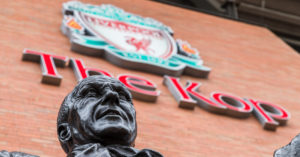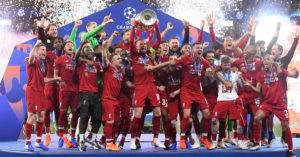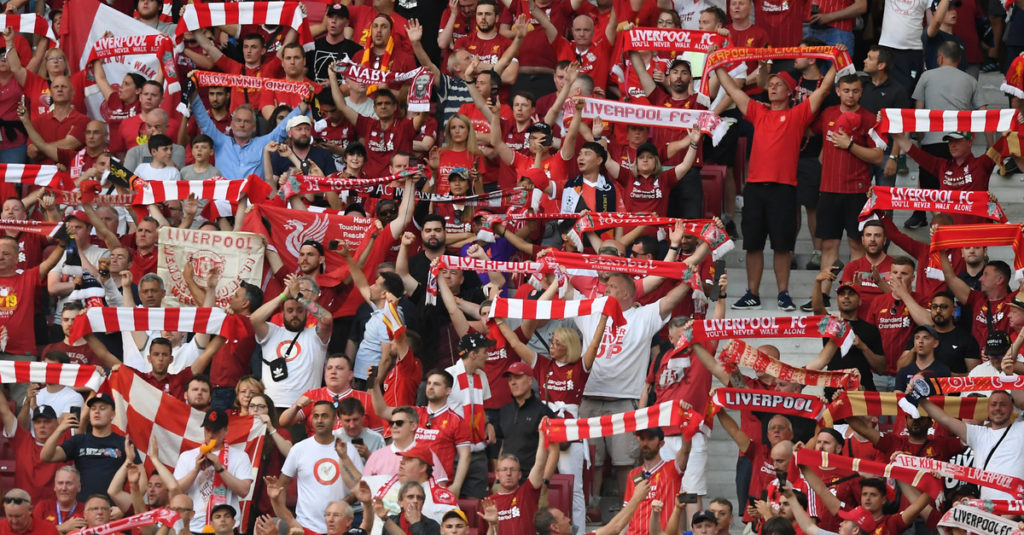Blogger Najm Al-Din says that football has largely replaced the role of religion in the lives of so many secular, irreligious Britons who’ve jettisoned real places of worship for football stadiums where the fill their spiritual voids.
I remember the first time visiting a football stadium to watch a live Premiership match with school staff and students.
As a Liverpool fan since childhood, visiting Anfield was a rite of passage and my memories from that Saturday afternoon in 1999 remain vivid to this day.
We could barely contain our excitement en route to Merseyside and spent much of the journey testing each other’s knowledge on the club’s distinguished history and listening to a teacher’s riveting account of the fluctuating emotions he experienced a few years earlier, when watching the epic 4-3s against Newcastle live from the terraces.
Upon arrival, we stopped by a cafe bedecked in red and white decorations and explored the official club store to stock up on fridge magnets, classic LFC scarves and memorabilia before that eagerly anticipated walk to the ground.
Strolling alongside local scousers in home colours before finally turning the corner and viewing the stadium from the outside was a surreal experience. After paying our respects at the Hillsborough memorial and stopping for photographs by the Shankly gates with other Liverpudlians, there was an electricity coursing through my veins and we were still an hour from kick-off.
Yet nothing could prepare me for the emotional high and goosebumps from that first glimpse of the grounds’ unique beauty.
Subscribe to our newsletter and stay updated on the latest news and updates from around the Muslim world!

The euphoric chanting from the crowd. The colourful banner display boards. The Kop End in all its majesty. “You’ll Never Walk Alone” bellowing out from the terraces. Heck, even the white markings on the pitch and smallest speck of grass were invested with profound meaning.
The sights, the sounds and the smells left a palpable excitement in the air and it’s no exaggeration to say that the sensation felt from soaking in the atmosphere was borderline spiritual. Forget watching a game from the living room. This was the holiest vantage point of them all and it felt as if we were pilgrims who had arrived at our pilgrimage.
When Michael Owen came onto the pitch, the buzz was indescribable. It was the season after he rose to international prominence following his iconic performance against Argentina at the World Cup in France, and he was the most prodigious talent in football at the time.
The boy wonder literally held the crowd by the palm of his hand every time he would bamboozle defenders with his frightening combination of pace and skill. His deftness of touch and burst of acceleration was instantly greeted with rapturous applause by the adulating spectators. It’s safe to say that the 45 odd thousand in attendance were just as captivated by the cult of Owen as they were with their team’s performance.
Is a passion for football healthy?
Although I am no longer a diehard football fan, I couldn’t help but be reminded of my transformative in-stadium experience and football’s ability to arouse the collective passions and loyalty of an entire nation after England’s recent victories against Germany and Ukraine.
The outpouring of emotions over the past few days and the feverish anticipation ahead of Wednesday’s semi-final clash with Denmark was not only reminiscent of my love affair with the game as a child. With football being so woven into our social fabric, it also made me question the extent to which such an attachment is healthy.
It’s difficult to gauge the value many of us place on the beautiful game. There is no sport on earth with as extensive an appeal and following as football. Its global reach and fanbase is unparalleled, catapulting it to more than just another spectator sport and pastime.
Not only do players possess the magnetism and power to pull at fans’ heartstrings, a single team can inspire unity, devotion, celebration, commitment and fervour among supporters of all walks of life who live in far flung corners of the earth and speak the same universal language.

Unlike neutrals, diehard fans are enthralled by their team’s success and absorbed by their accomplishments. Each of them live through the rollercoaster of emotions generated by their club or nation’s performance and collectively share the ecstasy of a win and crushing disappointment of a loss.
Like many football enthusiasts, my passion for the game was once all-consuming, dominating much of my thoughts and conversations. I would often find myself jealousy defending the reputation of my favourite players against criticisms from rival supporters, which in my estimation was beyond the pale and as egregious as tarnishing the honour of someone in the family.
Being so emotionally invested in my club’s contrasting fortunes, an important victory would leave me upbeat, brimming with joy and exuding a positive energy for the entire week. Meanwhile, a loss of any magnitude would leave me crestfallen for days on end.
Millions of fans up and down the country will readily identify with this tribalistic tendency. The greatest theatre of them all brings their communities together, unites them against a common enemy and offers them an emotional crutch to lean on.
Spiritual void
As someone who would eat, sleep and breathe football, it wasn’t until I developed a general appreciation for faith that the reasons behind the national obsession with football stoked my curiosity.
One of the defining changes in the British cultural landscape in the past century has been an increasing secularisation and waning spirituality. This mutation in the country’s mental space has created a massive spiritual void and represents one of the most significant ideological trends in British post war history.
As far as the sociology of religion is concerned, how we measure and define religiosity raises the important question as to whether aspects of our culture have assumed a functional equivalence to religion.
Today, the nation is living in an age of floating spirituality and contested religious space, leaving many of us atomised and religiously fragmented. As a result, many hidden idolatries are competing for our allegiance.
With British culture drifting further away from organised religion, the nation’s indifference to its faith-based tradition has left scores of faithless Brits naturally yearning for a higher calling. One of the ways in which secular societies have attempted to mitigate the effects of this vacuum and cultivate a sense of belonging is by immersing into what I consider to be pseudo-relationships.

Of the several opiates bred by faithless cultures, I would contend that football has emerged as something resembling a folk religion. Although official religions are often perceived as such due to their theological and liturgical forms, the insatiable appetite for the national sport has taken on some of the implicit characteristics and behavioural functions which we traditionally associate with religious practice.
There was a time in Britain’s history when religion would be the principal source of social cohesion and integration. Social groups would participate in rituals and specific faith-based symbolism and denominational adherence would be a manifestation of that unity. Christianity would play an instrumental role in reinforcing a sense of community and co-existence and its unifying potential was unmistakable.
The experiential dimension of what is traditional religiosity according to the Durkheimian sense, from its collective rituals to its emphasis on socialisation, has now found an alternative medium via popular culture, which often seeks direction, orientation and meaning through amusement like sport and has contributed significantly to constructing and reproducing what is ambiguously termed as “Britishness.”
For millions of Britons, there’s clearly more to the game than simply releasing dopamine. Besides fulfilling the psychological need for escapism, sports like football keep many at functioning capacity by evoking feelings of love, loyalty and solidarity, sentiments which were traditionally instilled through a devotion to the Almighty and a culture-wide spiritual outlook on life.
This is in sharp contrast to the profile of religion in contemporary Britain, a nation which appears to have written God’s obituary and found compensation through an aberrant quest for transcendence and meaning.
False Gods
By kindling a sense of awe and patriotism, community spirit and fellowship, transcendence is sought in stadiums which have substituted our places of worship and are treated with the same reverential potential of a Mount Olympus or Roman colosseum.
Prominent figures associated with clubs are now immortalised through permanent shrines and statues outside the ground, as the legions of supporters shift their allegiance from the place of prayers to the place of players.
Devout fans belong to congregations with imperishable social bonds and an unwavering pledge to remain committed to their team through hardship and ease. They are mesmerised and captivated by the performance of their managers and players, who are bestowed grandeur like the prophets of old, waiting to be crowned as sovereign.
Today, communion is seldom celebrated in churches and religious settings. Instead, sporting arenas have taken the function of temples where modern rituals are enacted, binding the individual to the community. Much like a Sunday mass, effervescent fans live with the conviction that they can raise the vibrations with their deafening roars and influence a game with their physical and aural presence, as everything from the chanting and singing of club anthems to face-painting and flag waving become ritualistic expressions of shared identity and heritage.

Stadiums and home grounds are where earthly miracles are performed for the tens of thousands of dedicated disciples affirming their personal affiliation to club and country. Enslaved by the stardom of elite athletes whose performances transcend the capability of ordinary human beings, many believers in attendance fawn at the feet of mortal men kicking a ball around a pitch for 90 minutes, who are held up as modern manifestations of graven images and golden calves and upon whom the nation’s hopes are pinned.
Of course, for many of us, the beautiful game is just a source of entertainment and welcome relief from our humdrum lives. But for others, it resonates at a compulsive level and has developed into a quasi-religion which fulfils powerful social-psychological needs. The spiritual connotation in their subjective shared experience week-in and week-out masks the disturbing reality of discontented souls seeking solace in illusory relationships.
Whether Football’s Coming Home or not remains to be seen. But in a society largely characterised by a shift away from institutional expressions of religiosity, the national sport has extended into the realm of implicit humanistic faith and has resurrected the religious instincts which have been largely suppressed in the post-Enlightenment era.
Although lacking a supernatural element, it has nonetheless occupied the collective consciousness with new layers of meaning and purpose, redefining what we traditionally perceived as rituals, sacred spaces and objects of devotion.




















